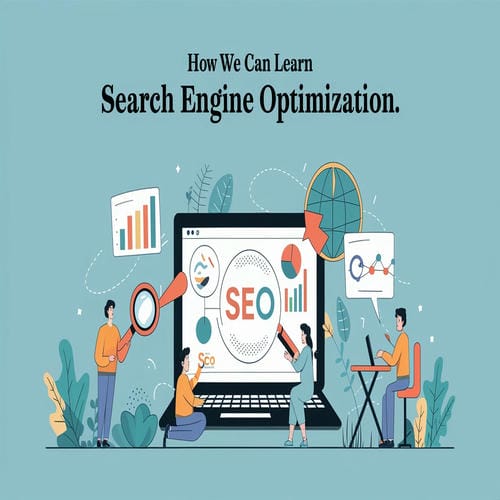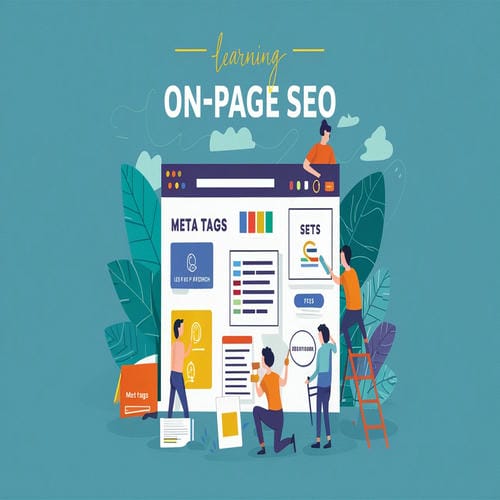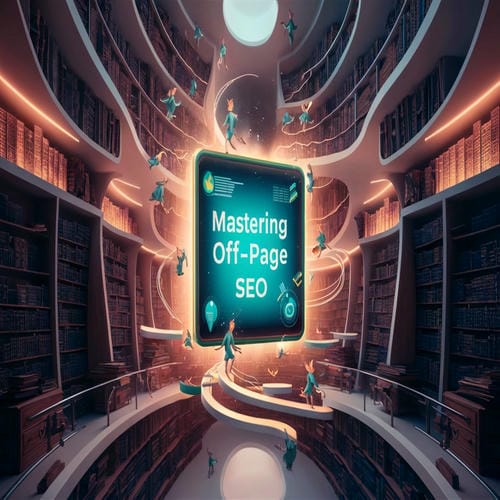Did you know that over 90% of online experiences begin with a search engine? Yet, only a fraction of websites ever see the coveted first page of search results.
This disparity begs the question: how can you ensure your website stands out in this crowded digital landscape? The answer lies in mastering Search Engine Optimization (SEO), a skill that can transform your online presence and drive significant traffic to your site.
But where do we start, and how can we learn Search Engine Optimization (SEO) effectively?
In this guide, we’ll unravel the mysteries of SEO, from its foundational principles to advanced techniques, providing you with a roadmap to becoming an SEO expert.
So, are you ready to unlock the secrets of SEO and take your website to the next level? Let’s dive in!
How We Can Learn Search Engine Optimization?
Search Engine Optimization (SEO) is the process of enhancing your website to improve its visibility in search engine results. Higher visibility means more traffic and potential customers.
1. Key Components of SEO
SEO encompasses three main components: On-page SEO, Off-page SEO, and Technical SEO. Each component plays a crucial role in improving your website’s search engine ranking.
2. How Search Engines Work?
Search engines like Google use bots to crawl web pages, index the content, and rank them based on relevance and quality. Understanding how search engines work helps you optimize your site effectively.
This foundational knowledge is essential for anyone looking to improve their website’s performance and drive more organic traffic. Dive deeper into each aspect to unlock the full potential of SEO.
Must Read:
- How to Optimize Website for Google Search Engine?
- Is Search Engine Optimization Worth it?
- How to Learn Search Engine Optimization?
- How to Earn Money by Search Engine Optimization?

Resources for Learning SEO
1. Books and eBooks
Explore authoritative books and eBooks that delve into the intricacies of SEO. Titles such as “The Art of SEO” by Eric Enge, Stephan Spencer, and Jessie Stricchiola provide comprehensive insights suitable for beginners and seasoned professionals alike.
2. Websites and Blogs
Stay updated with leading SEO websites and blogs such as Moz, Search Engine Land, and Ahrefs Blog. These platforms regularly publish valuable articles, guides, and case studies, offering practical insights into current SEO trends and effective techniques.
3. Videos and Webinars
Engage with YouTube channels and attend SEO webinars hosted by industry experts. These resources provide visual learning experiences and deep dives into specific SEO methodologies, ensuring a thorough understanding of complex topics.
4. Forums and Communities
Participate in SEO forums like Reddit SEO and Warrior Forum to interact with peers and gain firsthand knowledge from shared experiences. These communities foster discussions on emerging trends, troubleshooting challenges, and exchanging valuable advice.
By utilizing these diverse resources, you can build a solid foundation in SEO, stay abreast of industry developments, and implement effective strategies to enhance your website’s search engine performance.
Master the art of SEO with expert-led courses at Devtrain.co. Enroll now to enhance your digital marketing skills and elevate your online presence.
Related Articles:
- How to Become a Search Engine Optimization Specialist?
- How Does Search Engine Optimization Work?
- How to use Search Engine Optimization?
- How to Optimize a WordPress site for Search Engines?

Learning On-Page SEO
1. Keyword Research
Begin with thorough keyword research using tools like Google Keyword Planner, Ahrefs, or SEMrush. Identify relevant keywords that align with your website’s content and user intent. Effective keyword research forms the foundation of successful on-page SEO strategies.
2. Content Optimization
Optimize your content by strategically incorporating target keywords into headings, meta tags (title, description), and throughout the body text. Focus on creating high-quality, valuable content that addresses the search intent of your target audience.
3. User Experience (UX)
Enhance user experience by ensuring your website is mobile-friendly, loads quickly, and provides intuitive navigation. User-friendly design not only improves engagement but also contributes to higher search engine rankings.
Understanding and implementing these fundamental aspects of on-page SEO is crucial for improving your website’s visibility and attracting organic traffic. By optimizing your content effectively and prioritizing user experience, you can create a website that not only ranks well in search results but also provides a seamless browsing experience for visitors.
Trending Articles:
- How to Optimize Blog for Search Engines?
- How to Improve Search Engine Optimization?
- What is Search Engine Optimization?

Embrace SEO-friendly Content Creation
1. Creating Valuable Content
Focus on producing high-quality, relevant content that addresses the needs and interests of your target audience. Well-crafted content not only attracts visitors but also encourages engagement and improves your site’s authority in search engines.
2. Content Structure
Organize your content with clear headings, subheadings, and bullet points to enhance readability and user experience. Structured content makes it easier for both users and search engines to understand the information on your website.
3. Keyword Integration
Integrate target keywords naturally into your content while maintaining readability and avoiding keyword stuffing. Strategic keyword placement helps search engines understand the relevance of your content to specific queries.
4. Avoiding Duplicate Content
Ensure your content is original and unique to avoid penalties from search engines. Use tools like Copyscape to check for duplicate content across the web and make necessary adjustments to maintain originality.
By following these practices, you can create SEO-friendly content that not only meets the needs of your audience but also aligns with search engine guidelines. Effective content creation is essential for improving your site’s visibility, attracting organic traffic, and ultimately achieving your digital marketing goals.

Mastering Off-Page SEO
1. Link Building Strategies
Implement effective link building strategies to increase the authority and credibility of your website. Focus on acquiring high-quality backlinks from reputable sources in your industry. Natural, organic link building is key to improving search engine rankings.
2. Social Media Engagement
Utilize social media platforms to amplify your content and engage with your audience. While social signals may not directly impact SEO rankings, active participation can lead to increased brand awareness and indirect SEO benefits.
3. Brand Mentions and Online Reputation
Build your online reputation by earning positive brand mentions and reviews. Monitor mentions of your brand across the web and respond promptly to maintain a positive image. Positive brand sentiment can indirectly influence search engine rankings.
Effective off-page SEO strategies complement on-page efforts by establishing your website’s authority and relevance within your industry. By focusing on building quality backlinks, engaging on social media, and managing your online reputation, you can enhance your website’s visibility and attract more organic traffic over time.

Technical SEO Fundamentals
1. Website Architecture
Optimize your website’s architecture to ensure it is structured in a logical and organized manner. A distinct ranking helps search engines crawl and index your content efficiently. Use descriptive URLs, logical navigation, and a sitemap to enhance accessibility.
2. Site Speed and Performance
Improve your site’s speed and performance to enhance user experience and SEO rankings. Use tools like Google PageSpeed Insights to identify and fix issues such as large image sizes, inefficient coding, and slow server response times.
3. Security and HTTPS
Secure your website with HTTPS to protect user data and improve trustworthiness. Obtain an SSL certificate and implement HTTPS across your entire site. Google considers HTTPS as a ranking signal, which can positively impact your SEO efforts.
4. Structured Data Markup
Implement structured data markup (schema markup) to provide search engines with additional context about your content. This markup helps enhance rich snippets in search engine results, improving visibility and click-through rates.
By focusing on website architecture, performance optimization, security, and structured data, you can lay a solid foundation for effective SEO strategies and achieve long-term success in organic search rankings.
Join Our SEO Classes at Devtrain.co and Master Digital Marketing Strategies!
SEO Tools Overview
1. Essential Tools for SEO
Utilize fundamental tools such as Google Analytics and Google Search Console to gather data about your website’s performance. These tools provide insights into traffic sources, user behavior, and technical issues that may affect your SEO efforts.
2. Keyword Research Tools
Employ tools like SEMrush, Ahrefs, and Moz Keyword Explorer for comprehensive keyword research. These platforms offer data on search volume, competition level, and related keywords, helping you identify strategic opportunities for optimization.
3. Technical SEO Tools
Tools like Screaming Frog and Site Audit by SEMrush aid in conducting technical SEO audits. They identify issues such as broken links, duplicate content, and crawl errors, enabling you to optimize your site’s structure and performance.
4. Backlink Analysis Tools
Use tools such as Ahrefs and Majestic to analyze your website’s backlink profile. These tools provide insights into the quality of backlinks, referring domains, and anchor text distribution, crucial for developing an effective link building strategy.
By utilizing these SEO tools effectively, you can streamline your optimization efforts, monitor performance metrics, and implement data-driven strategies to improve your website’s search engine visibility and organic traffic. Understanding the functionalities of each tool empowers you to make informed decisions and achieve measurable results in SEO.
How to Rank #1 on Google
1. Understanding Google’s Ranking Factors
Google uses a complex algorithm to determine search engine rankings based on various factors. These include relevance, quality of content, user experience, and authority of the website. Understanding these factors is crucial for optimizing your website effectively.
2. Comprehensive Keyword Research
Perform thorough keyword research to identify relevant keywords with high search volume and moderate competition. Targeting the right keywords ensures your content is aligned with user search queries, increasing the likelihood of ranking higher in search results.
3. High-Quality Content Creation
Create compelling, informative content that addresses the needs and interests of your target audience. Focus on providing value and solving problems to establish authority and credibility in your niche.
4. On-Page and Technical SEO Optimization
Optimize on-page elements such as meta tags, headings, and content structure to enhance relevance and readability. Implement technical SEO best practices to improve site speed, mobile responsiveness, and security, which are factors Google considers in ranking.
By implementing a holistic approach to SEO, focusing on relevant keywords, creating high-quality content, and optimizing both on-page and technical aspects, you can improve your chances of ranking #1 on Google and driving significant organic traffic to your website.
How to Drive Traffic to Your Website
1. Organic Search Optimization
Optimize your website for organic search by implementing effective SEO strategies. Focus on creating high-quality content, optimizing on-page elements, and acquiring relevant backlinks to improve search engine rankings and attract organic traffic.
2. Content Marketing Strategies
Develop a robust content marketing strategy that aligns with your target audience’s interests and preferences. Create valuable content such as blog posts, guides, and infographics that provide solutions and information relevant to your niche.
3. Social Media Engagement
Engage with your audience on social media platforms to promote your content and drive traffic to your website. Leverage social media channels to build relationships, increase brand visibility, and encourage users to visit your site.
4. Email Marketing Campaigns
Utilize email marketing to nurture leads and drive traffic to specific landing pages or blog posts. Build an email list of subscribers interested in your content and send targeted campaigns that provide value and encourage click-throughs to your website.
5. Paid Advertising
Consider using paid advertising channels like Google Ads or social media ads to complement your organic efforts. Create targeted campaigns that align with user intent and drive qualified traffic to your website.
Each approach plays a crucial role in driving traffic and achieving your business objectives through digital marketing efforts.
Practical Application and Tools
1. SEO Tools Overview
Familiarize yourself with essential SEO tools such as Google Analytics, Google Search Console, and SEMrush. These tools provide valuable insights into website performance, keyword rankings, and traffic sources, enabling you to make data-driven decisions for optimization.
2. Performing an SEO Audit
Regularly conduct comprehensive SEO audits using tools like Screaming Frog or SEMrush Site Audit. Identify and resolve issues such as broken links, duplicate content, and technical errors that may hinder your site’s performance and search engine rankings.
3. Implementing SEO Strategies
Apply insights from your SEO audits to implement effective strategies. Optimize on-page elements, improve site speed and user experience, and refine content based on keyword research and competitor analysis to enhance visibility and attract more organic traffic.
Continuously monitor and adjust your approach to ensure ongoing optimization and maximize your website’s potential to reach and engage your target audience effectively.
SEO Tips
1. Quick Wins for Immediate Improvement
Implement quick SEO wins to see immediate improvements in your website’s performance. Optimize title tags and meta descriptions, ensure your website is mobile-friendly, and improve page load speed. These small changes can have a significant impact on your search engine rankings and user experience.
2. Advanced Strategies for Long-Term Success
Adopt advanced SEO strategies to achieve long-term success. Focus on creating high-quality, in-depth content that provides value to your audience. Build a robust backlink profile by acquiring links from reputable websites in your industry. Continuously update and refresh your content to keep it relevant and engaging.
3. Avoid Common SEO Mistakes
Be aware of common SEO mistakes that can negatively impact your website’s performance. Avoid keyword stuffing, duplicate content, and neglecting mobile optimization. Regularly audit your website to identify and fix any issues that may arise.
Implementing both quick wins and advanced strategies, while avoiding common pitfalls, will set you on the path to long-term SEO success. Keep refining your approach to stay ahead in the competitive online landscape.
Keeping Up with SEO Trends
1. Stay Informed
SEO is an ever-evolving field. Stay informed about the latest trends and algorithm updates by following reputable SEO blogs, attending webinars, and subscribing to industry newsletters. Keeping up-to-date ensures your strategies remain effective and compliant with current best practices.
2. Continuous Learning
Invest in continuous learning to enhance your SEO skills. Take advantage of online courses, certifications, and workshops to deepen your understanding of advanced SEO techniques.
3. Adapting to Changes
Be prepared to adapt your SEO strategies as search engine algorithms change. Regularly review and adjust your tactics based on performance data and new developments in the SEO landscape. Flexibility and responsiveness are key to maintaining and improving your search rankings.
Staying ahead of SEO trends is crucial for maintaining your website’s competitive edge. By staying informed, investing in continuous learning, and adapting to changes, you can ensure your SEO strategies remain effective and drive sustained success in search engine rankings.
Conclusion
Learning search engine optimization is essential for anyone looking to improve their website’s visibility and drive organic traffic. By understanding the basics, leveraging various resources, and implementing effective strategies, you can master SEO and achieve your digital marketing goals.
Stay informed about SEO trends, continuously refine your approach, and use the right tools to optimize your website. For comprehensive training and expert guidance on SEO and other digital marketing strategies, visit Devtrain.co and start enhancing your online presence today.
Ready to take your SEO skills to the next level? Explore our courses and resources at Devtrain.co and begin your journey to SEO mastery.


